OpenAI's ChatGPT Under FTC Scrutiny: Implications For The Future Of AI

Table of Contents
The FTC's Concerns Regarding ChatGPT
The FTC's investigation into ChatGPT likely stems from several key areas of concern regarding the responsible use of AI technologies. These concerns highlight the need for robust regulations and ethical guidelines within the rapidly evolving AI industry.
Data Privacy and Security
The FTC is likely investigating ChatGPT's data handling practices, focusing on several critical aspects:
- Collection, Use, and Storage of Personal User Data: Concerns exist about the volume of personal data collected during ChatGPT interactions and how this data is utilized and protected. The sheer amount of information users inadvertently share – from personal anecdotes to sensitive details – raises questions about potential misuse.
- Compliance with Data Privacy Regulations: Potential violations of regulations like COPPA (Children's Online Privacy Protection Act), designed to safeguard children's online privacy, and GDPR (General Data Protection Regulation), the EU's comprehensive data protection law, are under scrutiny. ChatGPT's user base spans globally, necessitating compliance with varying international regulations.
- Data Security and Breach Prevention: The security of user data stored and processed by OpenAI is a critical concern. The FTC will likely examine OpenAI's security protocols and their effectiveness in preventing data breaches and unauthorized access. Robust cybersecurity measures are paramount given the sensitive nature of the data collected.
- Potential for Misuse of Personal Data: The FTC will also assess the potential for the misuse of personal data gleaned from ChatGPT interactions. This includes unauthorized sharing, profiling, and potential targeting of users based on their conversations.
Algorithmic Bias and Discrimination
Another critical area of FTC concern likely involves algorithmic bias and discrimination present within ChatGPT:
- Bias in ChatGPT's Responses: The possibility that ChatGPT's responses reflect or perpetuate existing societal biases is a major concern. This could manifest as discriminatory outcomes based on factors like gender, race, or religion. The algorithms themselves might unintentionally amplify pre-existing prejudices.
- Lack of Transparency in Algorithms and Training Data: The opaqueness of ChatGPT's algorithms and the data used to train them makes it difficult to identify and address sources of bias. Greater transparency is crucial for accountability and effective mitigation strategies.
- Perpetuation of Harmful Stereotypes and Prejudices: Concerns exist that ChatGPT, without sufficient safeguards, could unintentionally reinforce harmful stereotypes and prejudices, potentially contributing to societal inequalities. Addressing this requires careful consideration of the data used to train the model and ongoing monitoring of its outputs.
- Need for Rigorous Testing and Mitigation: The FTC will likely scrutinize OpenAI's methods for testing and mitigating algorithmic bias. More robust testing methodologies and proactive measures are essential for minimizing the risk of discriminatory outcomes.
Misinformation and Malicious Use
The potential for misinformation and malicious use of ChatGPT is a significant area of investigation for the FTC:
- Generation of False or Misleading Information: ChatGPT's ability to generate human-quality text raises concerns about its potential for spreading false or misleading information (misinformation and disinformation). This includes the creation of convincing but entirely fabricated narratives.
- Malicious Uses, such as Deepfakes and Propaganda: The technology can be exploited to create deepfakes – realistic but fake videos or audio – and to spread propaganda or engage in other malicious activities. The potential for harm is substantial.
- Challenges in Detecting and Preventing Misuse: Identifying and preventing the misuse of ChatGPT presents a significant challenge. The FTC will likely examine OpenAI's efforts to implement effective content moderation and safety mechanisms.
- Need for Robust Content Moderation and Safety Mechanisms: The investigation underscores the need for advanced content moderation and safety mechanisms to detect and prevent the generation and dissemination of harmful content. This requires ongoing development and refinement of these systems.
Implications for OpenAI and the AI Industry
The FTC's investigation into ChatGPT has broad implications for OpenAI and the AI industry as a whole:
Increased Regulatory Scrutiny
The FTC investigation signals a potential wave of increased regulation for the AI industry. This could include:
- Stricter Data Privacy Requirements: Expect more stringent regulations concerning the collection, use, and protection of user data. This could involve enhanced data minimization practices and more rigorous security protocols.
- Mandatory Audits of AI Algorithms for Bias and Safety: Regular audits of AI algorithms to detect and mitigate bias and ensure safety will likely become mandatory. These audits could be conducted by independent third-party organizations.
- Greater Transparency Requirements for AI Model Development: Increased transparency in the development and deployment of AI models will be crucial. This could involve public disclosure of training data and algorithmic details.
- Establishment of Industry-Wide Best Practices and Ethical Guidelines: The AI industry will likely see the development and adoption of industry-wide best practices and ethical guidelines to ensure responsible AI development.
Impact on Innovation and Development
While increased regulation might appear to stifle innovation, it could also lead to:
- More Responsible Development of AI Technologies: Regulations can incentivize the development of safer and more ethical AI technologies.
- Greater Focus on Ethical Considerations in AI Design: Increased scrutiny will push AI developers to prioritize ethical considerations at every stage of the development process.
- Improved Trust and Public Acceptance of AI Systems: Responsible development and regulation can foster greater trust and public acceptance of AI systems.
- Increased Investment in AI Safety Research: The need to address safety and ethical concerns will likely lead to increased investment in AI safety research.
The Future of AI Development and Consumer Protection
The FTC investigation highlights the pressing need for a proactive approach to responsible AI development and robust consumer protection:
The Need for Ethical AI Development
The FTC investigation underscores the paramount importance of prioritizing ethics in AI development:
- Addressing Algorithmic Bias, Ensuring Data Privacy, and Mitigating Potential Harms: These remain critical challenges that require continuous attention and innovation.
- Promoting Transparency and Accountability in AI Systems: Greater transparency and accountability mechanisms are vital for building trust in AI systems.
- Encouraging Collaboration Between Researchers, Policymakers, and the Public: Collaboration is key to addressing the complex challenges associated with responsible AI development.
Strengthening Consumer Protection
The future of AI necessitates strong mechanisms to protect consumers from potential harms:
- Clearer Labeling and Disclosure of AI-Generated Content: Clearer labeling can help consumers identify AI-generated content and understand its potential limitations.
- Enhanced Mechanisms for Reporting and Addressing AI-Related Issues: Robust mechanisms are needed for consumers to report and address concerns related to AI technologies.
- Stronger Consumer Education and Awareness About AI Risks: Educating consumers about the potential risks and benefits of AI is crucial for responsible adoption.
Conclusion
The FTC's scrutiny of OpenAI's ChatGPT marks a pivotal moment for the future of AI. The investigation's outcome will significantly influence how AI technologies are developed, deployed, and regulated. Addressing concerns about data privacy, algorithmic bias, and malicious use is crucial for ensuring responsible AI innovation. This necessitates a collaborative effort between AI developers, policymakers, and the public to establish robust ethical guidelines and consumer protection measures. The future of AI hinges on our ability to navigate these complex challenges and build a trustworthy and beneficial AI ecosystem. Understanding the implications of the FTC's investigation on ChatGPT is key to shaping a responsible future for AI development. Stay informed on the latest developments regarding OpenAI's ChatGPT and the ongoing FTC investigation.

Featured Posts
-
 Nhl Draft Lottery Results New York Islanders Win 1 Overall Pick
May 13, 2025
Nhl Draft Lottery Results New York Islanders Win 1 Overall Pick
May 13, 2025 -
 Byd 5 Minute Ev Fast Charging Our Test And Results
May 13, 2025
Byd 5 Minute Ev Fast Charging Our Test And Results
May 13, 2025 -
 Salman Khan Box Office Flop Bhai S Biggest Disaster In 25 Years
May 13, 2025
Salman Khan Box Office Flop Bhai S Biggest Disaster In 25 Years
May 13, 2025 -
 Gov Abbott Orders Texas Rangers Investigation Into Plano Islamic Center Development
May 13, 2025
Gov Abbott Orders Texas Rangers Investigation Into Plano Islamic Center Development
May 13, 2025 -
 The Ftcs Antitrust Claim Against Meta Analyzing The Whats App And Instagram Acquisitions
May 13, 2025
The Ftcs Antitrust Claim Against Meta Analyzing The Whats App And Instagram Acquisitions
May 13, 2025
